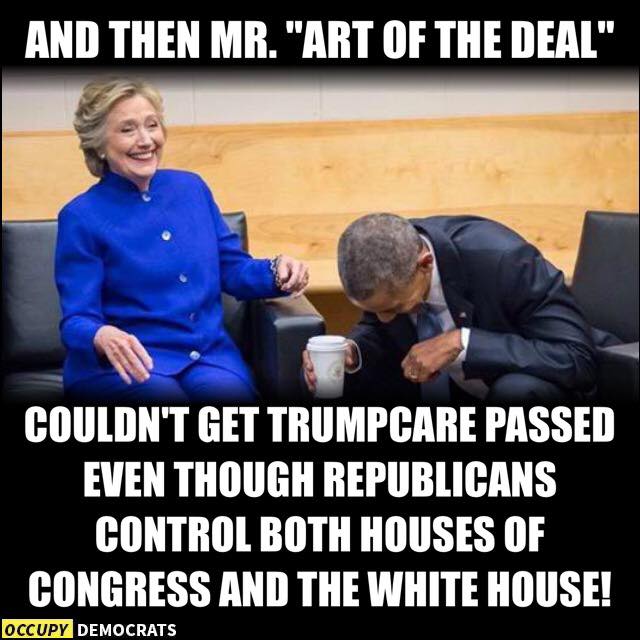Early Friday afternoon,
Republican leaders announced that they were
pulling the redrafted
health care bill from consideration, meaning that they won't be voting on it after all. At least not in this form and not now.
The more they tried to
change it to gain Freedom Caucus votes, the more
mainstream Republican votes were lost. There just seems no way to bridge that chasm. With a margin of only 21 or 22 votes to lose, they saw no way forward.
Even
the changes they were floating just
made the bill worse than it was, even objectively. The CBO graded the revised bill thus: premiums would go up, benefits would go down, and deficit relief would be reduced -- even as compared with the GOP's first bill.
Ryan couldn't make the numbers work. And
Trump's reputed
negotiating skills didn't work in Washington.
The truth is that
Trump didn't care much about health care. Despite it being one of his biggest campaign slogans ("We're going to repeal Obamacare, which is a total disaster, and replace it with something so great."), it wasn't what he was passionate about. What he is
passionate about is winning; and, despite what he said, he knew it was going to lose. He did seem, better than Ryan, to read the signs that this was doomed by the lack of unity within the Republican party. Or maybe Ryan was blinded by wanting it too much. To Trump, it was merely
an obstacle to getting to what he is passionate about:
tax reform and trade deals.
But let's not forget that
to Trump winning is everything. So, despite the lack of passion about health care, losing his first big legislative act is a huge blow.
What
Ryan is passionate about is getting rid of all entitlements. He's really, really a true-believer in Ayn Rand political philosophy that doesn't want government to do much of anything except encourage business enterprise and get out of the way of the free market. Ryan
saw repealing Obamacare as the first step toward going after Medicaid and eventually Medicare and Social Security.
It will be interesting now to
watch what happens to the relationship between Trump and Ryan. It started very badly during the campaign. Remember, Trump actually went to Wisconsin and tried to interfere with Ryan's own campaign for re-election. Then Ryan was very late and very reluctant to endorse Trump, even after he won the nomination.
The only positive spin to put on their relationship is to call it
a marriage of convenience. Now that each has an added grievance against the other about this loss, how will they move forward? Trump will resent Ryan's push to take up health care first; and Ryan can claim that
Trump's low approval ratings and his
ineptitude as a chief executive limited how much persuasive power he could bring to negotiations to bring House Republicans together.
Maybe there's a bit of truth to both. But the
biggest factors in this failure, in my opinion are: (1) This was
a terrible bill that just got worse as they tried to broaden its appeal to get more votes; in no way did it improve on Obamacare; (2) the
sharp division ideologically and temperamentally
among factions in the House membership itself; and (3) the
awakening of the American people to what was about to be taken away from them, and their remarkably effective activism in protesting to their representatives.
This is a huge, very significant loss for the Republicans generally, and for Ryan and Trump individually. It
calls into question their capacity to govern.
This, perhaps, is
the take-away lesson. Democrats knew they couldn't pass a single-payer plan back in 2009. So they devised a plan that combined some market-based features with a lot of government-support to make it affordable for everyone. Now
Republicans have tried to devise a market-based plan, and
it just can't be done --
if you want to cover everyone equally and be affordable. They've proved that. The next step is: single payer.
Ralph


